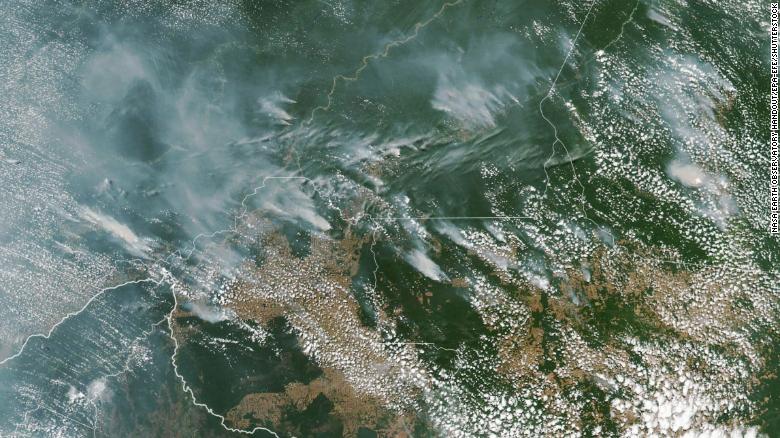This week’s sustainability news is big. The world’s largest rainforest has been burning for almost twenty days and we *just* found out. WWF releases a scary report about the world’s forest animal population. We hear from Greenlanders about their climate anxiety, and more. The week’s top headlines all in one place…
1. Wildfires have been raging in the Amazon rainforest, the world’s most important ecosystem. And we only just found out.
Just a while ago, the Arctic was on fire. Now, the Amazon rainforest is burning at a highly unusual rate too. According to Brazil’s space research centre, wildfires have hit a record number. At almost 73,000 fires detected, it marks an 83% increase over the same period of 2018. Apocalyptic-looking images and videos on social media show giant plumes of smoke rising from the greenery, reaching all the way to Sao Paolo. Sao Paolo, by the way, is thousands of kilometres away! Images show the sky pitch black in the middle of the afternoon. Activists are blaming their president Jair Bolsonaro, who took office in January. Back then, he vowed to develop the Amazon for farming and mining. He’s since called proof of deforestation “lies” and insists that NGOs are setting fire to the Amazon.
Mainstream media is just catching onto this critical climate news. The media may be broken, but social media isn’t. Keep spreading the word!
2. Since 1970, the world’s forest animal population has dropped 53%.
53%! The study, titled Below The Canopy, tracked the development of 268 vertebrate species and 455 populations in forests all over the world. Over 60% of the decline is apparently caused by deforestation and forest degradation. In light of the drastic decrease, the WWF has called on the international community to declare a global forest emergency. Thankfully, recovery is possible. WWF said that local communities should be engaged to address overexploitation, invasive species, and other conservation strategies.
We’re not losing hope just yet.
3. First-ever poll shows how worried Greenlanders are about climate change.
Greenland is on the frontlines of the climate breakdown. But we’ve not heard from the Greenlanders themselves, just about them. A new survey reveals that climate change is putting undue stress on their lives, livelihoods and emotions. Three-quarters of those surveyed said that they’ve felt the impacts personally and emotionally. This is in line with the global trend of the emotional toll climate change is taking on people. Two-thirds of them even worry about the impact climate change is having on sled dogs, which was ranked as the highest concern. As we’ve mentioned before, what happens in the Arctic doesn’t stay in the Arctic. We should all be worried too, which only gives us more impetus to act.
Will you take action before it’s too late?
4. Climate change will cripple economies regardless of wealth.
This really isn’t new news at this point. We did at one point say that climate change will worsen global inequalities, but that doesn’t mean that everyone won’t be affected in the looming global crisis. (By the way, here’s our breakdown of understanding the end-of-the-world report if you want to know more about that.) In a new report, researchers who examined data from 174 countries over 50 years found that persistent temperature changes above or below the historical norm greatly affected economic growth. They concluded that climate change will damage all economies regardless of wealth, by the year 2100. Yikes. But if we have stronger mitigation policies, we can still face substantially lower losses.
Bottom line? It’s not too late, people.
5. G7 and fashion houses join forces to make fashion more sustainable.
We’ve talked about why we need a fashion revolution. This year, over 20 fashion retailers and brands will be joining the G7 leaders for a key fashion moment. A global pact to fight the climate crisis and protect biodiversity and the oceans. The 20 include the owner of Gucci, H&M, and even Zara’s parent company Inditex. (Inditex, if you don’t know yet, is one of the all-time Big Bad Guys of Fast Fashion. The founder was once the richest man in the world, and still remains among the top.) This pact is a big deal. And according to chief sustainability officer of Kering, will enable them to share best practices and combine their power to push for change.
It’s about time fashion did something big.
Image credits: NASA



